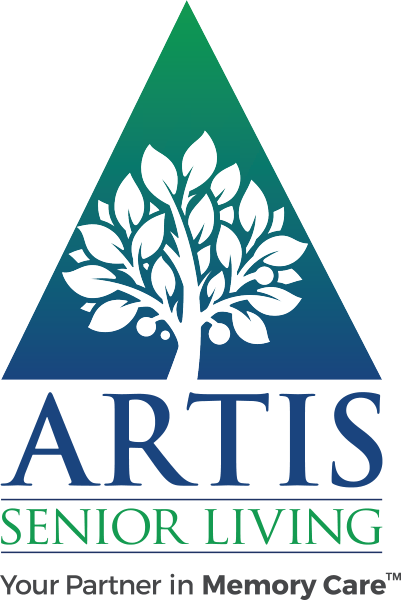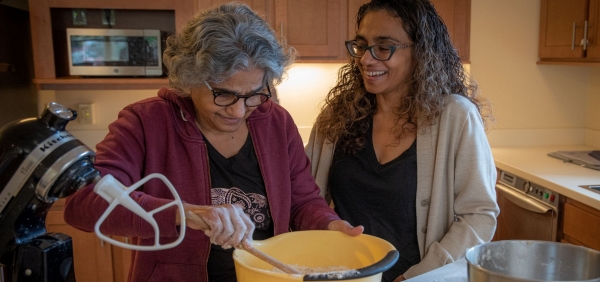How to Talk to Parents About Assisted Living

As your parent(s) grows older, there may come a time when they require additional assistance to manage affairs and accomplish daily tasks. Perhaps you begin noticing their mobility is starting to fade or they’re not able to keep up with the house like they used to.
In your efforts to ensure your aging parent is supported and continues to enjoy every day, have you wondered whether they’d be best supported in assisted living?
- Without question, assisted living facilities have evolved into a great option for aging adults and families trying to provide them with an appropriate level of care.
While the topic of assisted living can be a difficult conversation to initiate, the time may come when there simply is no other viable option.
That’s why working with your aging parent to help them understand the benefits of assisted living — while also remaining sensitive to their personal feelings — can aid in addressing their apprehension and reinforce just how beneficial a high-quality assisted living facility can be.
Signs Your Aging Parent Needs Help
While making the decision to transition a loved one to assisted living can be difficult, understanding the warning signs is essential to knowing when the option becomes a necessity. Some of the more obvious indicators include:
- Experiencing recent injuries or falls
If your loved one injures themselves significantly, how long might it be before someone arrives to help? Fall-related injuries account for approximately 800,000 hospitalizations each year. If you’re concerned about an aging parent, make sure to watch for indications of a recent fall or injury, such as broken bones or significant bruising. Frequent falls are a sign that it may be time for an assisted living facility.1
- Increased disorientation and forgetfulness
Have you begun noticing your loved one displaying increased forgetfulness or perhaps even wandering out of their home without a clear sense of where they’re going? This is an obvious sign of dementia and one that needs to be addressed immediately. Often, individuals experiencing dementia benefit from residing at an assisted living facility with a memory care unit designed to make their life safer while also easing their anxiety and confusion.1
- Struggling to maintain personal hygiene
Has your aging parent stopped taking care of themselves and managing their personal hygiene like they used to? This can be a sign that they’re having a hard time bathing, which puts them at risk of infection and increases the likelihood of mental and emotional decline. Problems with self-care or other activities of daily living are an indication that your loved one may not be capable of managing the expectations of living by themselves.1
- Deteriorating eating habits and noticeable weight loss
Have you noticed that your loved one has begun eating only takeout food or increasingly unhealthy meal options? Has their weight changed significantly in the last few months? Significant weight fluctuations can be a sign of serious medical problems or an indicator that they’re having trouble preparing food for themselves. That’s why it’s important to talk with your loved one and their doctor about possible reasons for the change in weight.1
- They’ve begun showing signs of depression and isolation
Has your loved one gone days without leaving the home? Have they stopped engaging in social activities they used to enjoy? They may be scared to drive or uncomfortable participating in social events that used to make them happy because their memory is failing them. Having an honest conversation about why they spend so much time at home can help you get to the root of any problems they might be facing and indicate whether they should consider moving to an assisted living facility.1
How to Talk to Parents About Assisted Living
Finding a way to broach the topic of an assisted living facility can be uncomfortable, even if it’s absolutely necessary for the safety and health of an aging parent. That’s why the best time to begin a discussion of this nature tends to be when your parent brings up a problem they’re experiencing and asks you for help addressing the issue.
However, if you’re struggling to find this type of opportunity, initiating the conversation when everyone is relaxed can be the next best thing. While the conversation may be difficult, having the talk when everyone is calm and there is no imminent threat to their overall health is helpful.
It allows the conversation to proceed a bit more smoothly and ensures you’re able to approach the discussion with an appropriate amount of sensitivity and compassion.2
Some important keys to remember include:
- Be honest throughout the conversation
Without question, talking about assisted living with a parent who has been independent their entire life can feel a bit intimidating. But, approaching the topic in a transparent and empathetic manner can mean all the difference. If you focus on their wellbeing and the importance of them remaining safe and secure, the conversation can be easier to initiate.3
- Respect your parent’s perspective
It’s important to remember that your parents have lived as adults for a very long time, and giving up that kind of independence is no easy thing to do. Hopefully, with enough time, respect and honest conversation, you and your loved one can reach an agreement about what is best for their continued health and happiness.3
- Keep your emotions in check
Your loved one’s situation may seem urgent to you, but it’s essential to stay calm and positive throughout the process. That’s because your aging parent may not have the same view that you do, and they may think they’re doing just fine. If you become angry or frustrated, this might make your parents defensive and more resistant. So take a few deep breaths and try to approach the discussion in a calm and composed manner.4
How ArtisCan Help You Prepare for the Conversation or Transition Your Parents into Assisted Living
An assisted living facility such as Artis can be the perfect transition for your loved one who finds themselves needing help managing their daily life in a safe living environment.
With specialized assistance with activities of daily living such as meal preparation, housekeeping, medication reminders, bathing and dressing, our residents can continue to safely enjoy a full and satisfying life.
As a leading developer-owner-operator of Memory Care Assisted Living residences with over 20 communities operating in 11 states, we’re dedicated to caring for individuals with Alzheimer’s disease and other dementias.
Do you have questions for us as you prepare to talk with your aging parents about assisted living? We fully understand the complexity of a conversation of this nature, and we’re here to help you understand how best to have this conversation or how your parents would transition into assisted living at Artis.
Our Health Services & The Artis Way
At Artis, we’re committed to not simply taking care of your loved one, but also providing them with a sense of home and community that is second to none.
With secure access to the outdoors and community interiors that are easy to navigate and maintain comfortable design, we strive to ensure all our residents feel safe and secure from the moment they move into our assisted living community.
We’ve made it our mission to join together with our residents and their family members to create a haven of dignity, empowerment, well-being and comfort for their entire stay.
Your Partner Throughout the Memory Care Journey
If you have a loved one who needs assistance and you have questions about next steps, contact us or give us a call at 484-392-5573.
We respect your loved one’s interests and inspirations and allow them the freedom to choose how they spend each day while providing you the assurance that they’re protected and safe. That’s The Artis Way.
Learn more about our unique and dedicated approach to memory care.
Resources:
1 Caring.com. How to Talk to Your Parents About Senior Care. Accessed August 24, 2021. https://www.caring.com/caregivers/starting-the-conversation/.
2 U.S. News & World Report. 5 Strategies for Talking to an Aging Parent About Assisted Living. Accessed August 24, 2021. https://health.usnews.com/best-assisted-living/articles/talking-to-an-aging-parent-About-assisted-living.
3 Seniorly. How to Speak to Your Parents About Assisted Living. Accessed August 24, 2021. https://www.seniorly.com/resources/articles/how-to-speak-to-your-parents-about-assisted-living.
4 NPR. How To Talk To Parents About Assisted Living. Accessed August 24, 2021. https://www.npr.org/templates/story/story.php?storyId=126167767.



